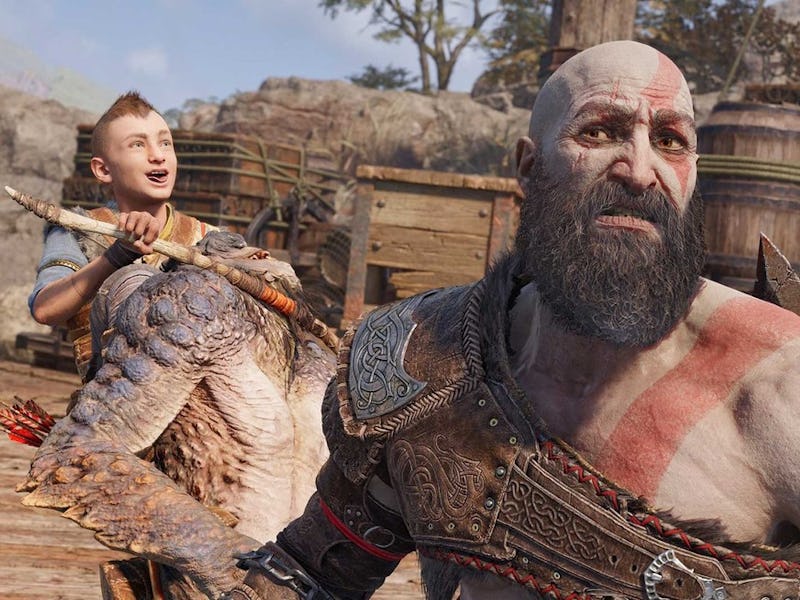Valhalla is Hades with a God of War Skin, and It's Great
This is Valhalla!

Not far into God of War Ragnarök, it becomes quite clear how much inspiration its new free Valhalla DLC takes from 2020 roguelike gem Hades. While playing, it often feels like Hades with a God of War veneer layered on top. It could easily feel trite, but somehow, it works.
It’s immediately obvious that Valhalla is a roguelike. But the further in you go, the more comparisons there are to make between it and Supergiant’s Hades specifically. You have a choice of a weapon and a shield at the start (and one from each category will always grant a bonus), then there are the chests that give you a benefit in exchange for a curse you must endure for several encounters, and eventually, you’ll come upon areas that let you choose which prize you’ll win, should you make it through the next battleground — all of which are mechanics found in Hades. Plus, Valhalla conjures up places and enemies from Kratos’ memory, notably throwing in elements from Sparta, so the Greek pantheon and all of its familiar baddies come out to play.
These comparisons mean that even God of War has a Sisyphean task trying to live up to its inspiration because Hades is just that good at what it does. Yet, Valhalla knows exactly where to pull back and embrace the fact that, at the end of a playthrough, this is still God of War Ragnarök. The combat is the same, Kratos keeps his weapons and their skills, and he still has his signature Rage ability. The only real combat difference between the main game is that Kratos no longer has access to the Runes he’s collected, and all of his gear becomes cosmetic. This is actually a blessing because the convoluted armor system in the main game is extremely tedious, in my opinion. And it wouldn’t be a roguelike if Kratos didn’t have to slowly earn abilities by proceeding through fights, adding extra attacks to his weapons upon victories.
God of War Ragnarök’s Valhalla DLC is as much, if more, about Kratos’ personal journey as it is about gameplay.
Even more importantly, the DLC doesn’t let the roguelike gameplay take center stage — never for too long, anyway. Valhalla isn’t just a gameplay filler after players finish the campaign. Instead, it serves as more of an epilogue to Ragnarök, continuing Kratos’ story. We see, once again, that the god of war’s personal journey is not linear, nor is it immediate. His ability to grow and change from the vicious god he was in the prior trilogy is a key element in both 2018’s God of War and Ragnarök. But the story never asks us to suspend our disbelief so far as to assume this transformation can happen overnight. We see Kratos slowly call Atreus by his name rather than just “boy,” “boy,” over and over again. We have insight into his own self-doubt. And we see him make mistakes, sometimes still faltering and falling back into his old vicious habits.
Valhalla knows when to reject the roguelike gameplay in favor of exploring this narrative, as evident from the first playthrough. Hades, and other roguelikes, are possible to beat on the first run, though that’s certainly a sizeable challenge. But Valhalla pulls you back and forces you out early in your first attempt, and every attempt after that too. That’s because Valhalla isn’t ultimately about the rote gameplay loop, fun as it is. It is, at its core, about the story. You can’t proceed until Kratos is mentally ready — forcing you to go on this personal and intimate journey with him.
You’ll have to keep progressing to peel back the layers of Kratos’ memories.
All of this makes the choice to root the DLC in a roguelike format feel more intentional. This set of God of War games is all about choices, especially whether we are doomed to repeat our actions or if we can break from our habits. This cyclical nature is the embodiment of Kratos’ inner turmoil. Will he destroy everything around him for his family once again, or will he find another way this time? Will he find himself back in a position of power, and if so how will he wield it this time? And, by the gods, will he ever start getting some desperately needed therapy in all the nine realms? Mimir is doing his best, but even the smartest man alive can only do so much.
If all of this seems a bit on the nose, that’s because it is. Ragnarök especially knocked players over the head with its message. Still, despite the handholding, it’s a story worth following. And the way Valhalla pulls you out and makes you slow down to Kratos’ pace makes each run worth diving back into because you’re not just making progress in the DLC, you’re seeing a story unfold. Valhalla feels like an entire game within a game, packing in enough content to make the DLC worth paying for. The fact that it’s free feels like an early Christmas present.